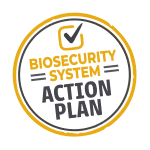Why New Zealand needs an effective biosecurity system
Biosecurity is about keeping out, getting rid of, or managing pests and diseases that threaten New Zealand. It helps protect our:
- economy
- native plants and animals, our taonga species
- land, rivers, and oceans
- culture, health, and lifestyles.
New Zealand’s biosecurity system comprises many parts to manage risks offshore, at the border, and within New Zealand. Those parts include people, tools, technology, processes, and rules.
While New Zealand’s system is working well, biosecurity threats are growing in scale and complexity. Risk pathways (the ways new and unwanted pests and diseases can get here), along with climate, are changing.
There is increasing pressure from both new and established pests and diseases.
A shared, forward-looking view of New Zealand’s biosecurity system was needed to guide priorities for improvement and use existing resources to their fullest potential.
The new shared action plan will help people and organisations across the biosecurity system work together more effectively.

Biosecurity system action plan [PDF, 350 KB]
How the 'Biosecurity system action plan' was created
The action plan was developed with input from a broad range of biosecurity system participants including government, Māori, industry and business, researchers, non-government organisations, and communities.
It draws on, and replaces, 2 previous biosecurity system strategies which have now expired. Development began with a review of these earlier strategies – identifying what worked well, what didn’t, and where progress had been made – so the action plan could build on existing thinking, successes, and achievements.
Delivering the action plan
The 'Biosecurity system action plan' is a shared commitment to strengthen New Zealand’s biosecurity system. To make it a reality, people and organisations will need to work together, sharing their skills, time, and resources. It will be owned by those who commit to leading and helping deliver actions.
It will be delivered in 2 tranches with significant progress expected by 2030. Tranche 1 actions are the immediate priority and will be the initial focus of coordination. Tranche 2 actions remain important, and can start now, but coordination will be lighter until Tranche 1 is well underway.
Actions for tranche 1:
- 1 – Setting biosecurity system expectations and KPIs.
- 2 – Clarifying and enabling roles and responsibilities.
- 3 – Data integration, management and use.
- 4 – Managing aquatic pest and disease risk.
- 5 – Establishing a domestic emerging risk network.
- 7 – Widely accessible training tools.
- 9 – Developing prioritisation tools.
- 15 – Strengthening connections between science and local knowledge.
Actions for tranche 2:
- 6 – Building on successful local and regional initiatives.
- 8 – Building on importer, exporter and grower initiatives.
- 10 – Understanding social and cultural impacts.
- 11 – Developing a long-term investment plan for infrastructure.
- 12 – Simplifying industry biosecurity levies.
- 13 – Effective uptake of new and emerging technologies.
- 14 – Addressing major biosecurity challenges.
- 16 – Expanding control tools.
How you can get involved
The steering group is holding some workshops in February and March. In February, we're running 2 online introductory sessions. The 75-minute sessions will outline the plan and how people can work together to deliver it. We held the first session on 20 February.
The next session is on 26 February 2026 at 10am. You must register to receive an invitation.
Introductory session registration form – SurveyMonkey
Watch a recording of the first session
If you weren’t able to attend, you can watch a recording.
Introductory session 1: 20 February 2026 – Zoom
Use the password: NX3wy..i
Online workshops
In March, the steering group is holding online action-specific workshops. These 3-hour workshops will build on the February introductions and are designed primarily for people and organisations who see delivery of an action as part of their core business – and who want to actively shape how that delivery will work.
The workshops will focus on:
- building a shared understanding of the action
- agreeing high-level delivery approaches
- identifying action leads and key contributors
- connecting existing projects and initiatives.
Dates and times of workshops
- Action 1 System Expectations & KPI: 3 March at 9am
- Action 2 System Roles: 12 March at 1pm
- Action 3 Data Integration: 10 March at 9am
- Action 4 Aquatic Risk: 25 March at 1pm
- Action 5 Emerging Risk: 17 March at 9am
- Action 7 Training Tools: 4 March at 9am
- Action 9 Prioritisation: 24 March at 1pm
You must register to attend a workshop.
Action-specific workshop registration form – SurveyMonkey
Want more details?
Our 'call to action' document has more information on the intent behind each of the actions.
Call to action document [PDF, 528 KB]
For questions, email us at biosecurityactionplan@mpi.govt.nz








